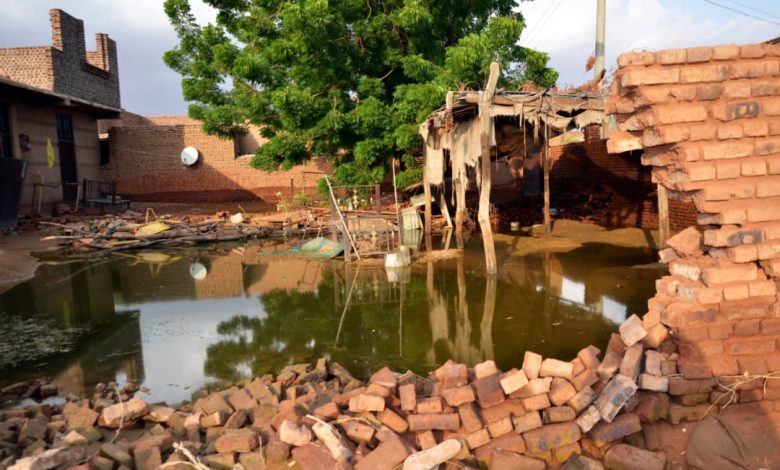Umm Durman: Malaria and Cholera Outbreaks Due to Stagnant Water

Reporter – Ater
One of the consequences of the heavy rains that continued for about a week in Umm Durman, varying between torrential downpours and drizzles, after the war left the city in ruins and deep damage, is that expectations indicate an outbreak of diseases endemic to the region, with fears that if the authorities do not move towards mitigating the effects of these rains, the situation will worsen.
Within ten days, the clinic in Abada village, located 14 kilometers from Suq al-Neqeela, received 29 cases of malaria. Dr. Amumi Fadl, a doctor whose name has been kept confidential for security reasons, said to the “Ater” correspondent that the cases are on the rise due to the appearance of mosquitoes and stagnant water, with some deaths among the infected.
The doctor also informed that a 13-year-old child named Abd al-Rahman Ibrahim died from malaria. The 23-year-old Khadira also died due to malaria.
Cholera cases appeared in areas of Umm Durman, and according to the Emergency Committee of the Federal Ministry of Health, the confirmed cases of cholera reached 268 cases, 17 of which were fatal. Another source from the monitoring and follow-up team informed the “Ater” correspondent that the hospital received nine cases that are suspected to be cholera.
The Emergency Committee of the Federal Ministry of Health said in a report on Tuesday that the Directorate of Environmental Health and Safety is currently preparing a large stockpile of chlorine to be distributed to several states to prevent new cholera cases.
Dr. Samira Mohiuddin, speaking to the “Ater” correspondent, said that the lack of drainage and closing of sewage systems, along with the rainfall and standing water, are likely to exacerbate the issue, as citizens’ efforts to combat mosquitoes, flies, and other insects are absent.
However, Dr. Fadl Ismail, the head of the Supreme Committee for Autumn Emergencies in the state of Khartoum, told “Ater” that the Emergency Committee, which includes groups like “Humans for Health” and “Organization for Safety and Protection,” has been working tirelessly since the beginning of autumn to combat the negative impacts of rain and stagnant water. The official added that despite the challenges, the army managed to open about 200 kilometers of sewage systems in the region between Soba and Umm Durman.
Dr. Ismail said that the Autumn Emergencies Committee faces challenges due to the presence of mines and explosives left behind by unauthorized groups in several areas, but it was able to overcome this through the support of the military.
Meanwhile, Taha Al-Noor, who still lives in Al-Hara 17 in the city, which is controlled by rapid support forces, told “Ater” that the torrential rains took their toll on these areas, and the stagnation of water caused severe problems, increasing the amount of stagnant water. Many citizens have been forced to flee their homes.
Medical sources in Umm Durman indicate an increase in cases of typhoid, meningitis, gastrointestinal diseases, and respiratory infections. The sources added that this trend began during the last two weeks and noted that the Autumn Emergencies Committee was able to distribute health awareness leaflets and hold awareness workshops to the affected residents.
The sources also mentioned that an increase in malaria cases was observed in the region, and reports indicate that the cost of malaria treatment ranges between 25,000 to 35,000 Sudanese pounds due to the unavailability of mosquito nets.
The torrential rains have also swept into the neighborhoods, and residents have begun creating barricades to prevent floodwaters from entering their homes, but the rapid support forces have exploited this situation by sending their forces into these areas to gain control.
A source from the Ministry of Health in the state of Khartoum indicated that the situation remains dire as the Emergency Committee is unable to contain the cholera and malaria outbreaks in the homes and the areas controlled by rapid support forces, despite the efforts to control the epidemic.



